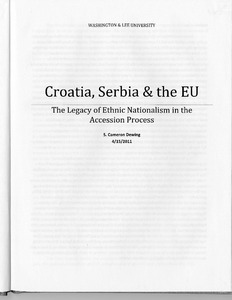| dc.rights.license | In Copyright | en_US |
| dc.creator | Dewing, Sarah Cameron | |
| dc.date.accessioned | 2023-10-20T17:40:06Z | |
| dc.date.available | 2023-10-20T17:40:06Z | |
| dc.date.created | 2011 | |
| dc.identifier | WLURG038_Dewing_thesis_2011 | |
| dc.identifier.uri | https://dspace.wlu.edu/handle/11021/36333 | |
| dc.description.abstract | The Western Balkans, as the international community now labels the former Yugoslavian states, presents a particular challenge to the political sphere. Throughout history the international community labeled this region a powder-keg, always on the verge of conflict. The frequency of conflicts through the twentieth century only reinforced this idea, lending many to believe in their inevitability. The wars of the 1990s affected the political realm in many ways, including by highlighting the inadequacies of the international community in addressing conflict in their own backyard. Europe had no war on its soil from World War II until the1990s, and when it did occur, the EU could not stop it. This revelation led the EU to again pursue accession as a foreign policy tool and attempt to stabilize this area permanently. This paper addressed the legacy of ethnic violence in Croatia and Serbia, as representative of the former Yugoslav region, in relation to their potential membership to the EU. Serbia and Croatia, of the
Western Balkan states, had the largest roles in the ethnic conflicts of the past century and both have pursued accession in the past decade. More than the incidence of violence, however, this paper examines the influence of manufactured hatreds and the role of nationalism within these governments. This paper has six chapters, each addressing a different facet of this issue. The first three give the background of both the Balkan states and the EU and build a framework to analyze the states' current progress. The latter three analyze the progress made by Croatia and Serbia in the last decade and compare their progress, looking at each state's path in the last decade and the continuing legacy of war crimes. [From Introduction] | en_US |
| dc.format.extent | 70 pages | en_US |
| dc.language.iso | en_US | en_US |
| dc.rights | This material is made available for use in research, teaching, and private study, pursuant to U.S. Copyright law. The user assumes full responsibility for any use of the materials, including but not limited to, infringement of copyright and publication rights of reproduced materials. Any materials used should be fully credited with the source. | en_US |
| dc.rights.uri | http://rightsstatements.org/vocab/InC/1.0/ | en_US |
| dc.subject.other | Washington and Lee University -- Honors in Politics | en_US |
| dc.title | Croatia, Serbia & the EU: The Legacy of Ethnic Nationalism in the Accession Process | en_US |
| dc.type | Text | en_US |
| dcterms.isPartOf | WLURG038 - Student Papers | en_US |
| dc.rights.holder | Dewing, Sarah Cameron | en_US |
| dc.subject.fast | International relations -- European Union countries | en_US |
| dc.subject.fast | International relations -- Balkan Peninsula | en_US |
| dc.subject.fast | Sovereignty | en_US |
| dc.subject.fast | Nationalism -- Balkan Peninsula | en_US |
| local.department | Politics | en_US |
